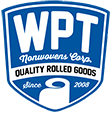Problems with Conventional Filtration Materials
The environmental toll of conventional filtration materials is undeniable. Plastics, notorious for their non-biodegradable nature, often end up in landfills or oceans, posing a severe threat to ecosystems. Biodegradable nonwovens offer a sustainable answer to this problem since they decompose naturally, minimizing environmental harm.Increasing Need for Green Filtration
One of the key drivers behind the adoption of biodegradable nonwovens is the growing awareness of environmental issues, not only for businesses, but consumers. As demand for sustainability grows, industries are under pressure to reduce their ecological footprint. Biodegradable filtration technology presents a viable option to meet these demands without compromising on performance.Tightening Restrictions and Regulations
Regulatory bodies worldwide are tightening restrictions on single-use plastics, further incentivizing the shift towards biodegradable alternatives. Manufacturers are prioritizing investment in research and development to innovate new materials and processes that align with these regulations, while still maintaining product performance and affordability.Sustainable Benefits for a Wide Range of Industries
The applications of nonwoven filtration fabrics extend across various industries. Applications for biodegradable filtration nonwovens span a wide range of industries, including:
- Air and water filtration
- Healthcare
- Industrial processes
